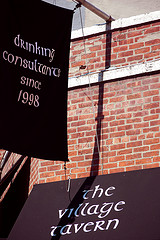Looking for an entry level job or internship in consulting? This is an overview of how to approach the search and a list of companies that might have relevant entry level and internship opportunities.
Whenever I go into a bakery I’m overwhelmed by the selection of amazing smelling treats. How could I possibly decide between a snickerdoodle and chocolate chip cookie?! I typically end up weighing factors like how expensive they are, how big they are compared to each other, and what I’m feeling more in the mood for at that moment. But my life would be a lot easier if I had a cookie consultant like Cookie Monster to help me make the best decision. On an everyday basis, real consultants tackle much larger issues, but the premise is the same–they help clients make the best decisions in specific areas where their knowledge is deep, and their client’s is not.

Photo Credit: Flickr user laverrue
A consultant has a wide knowledge of a particular subject and provides expert advice in that specific field to a client or company lacking significant experience in that area. Consultants work in fields like management, technology, law, or graphic design. More specifically a consultant finds solutions to address specific issues in the way they see fit within constraints such as budget and resources agreed with the client.
During a typical day, a consultant spends a lot of time researching, sharing learnings with their team, and communicating best ideas with clients. A consultant might go through emails first thing in the morning, then spend time discussing with old colleagues about past projects, or completing surveys and questionnaires, or doing client interviews. Later, they might spend time doing a progress report with another client in a meeting–or take a client to lunch. They typically make many calls and hold team meetings trying to reach a consensus about how to address the issues and what their recommendations should be. Another thing consultants tackle is making the data they’ve collected understandable to the client by using Excel or Powerpoint to compile the data.
A consultant tends to make between $50,000-$180,000 per year. In terms of other opportunities down the road you could become a business process consultant ($44,000-$148,000), or a senior professional service consultant ($61,000-$157,000).
Here are some hot spots for consultants:
To be a consultant you should have a college degree in your field of consulting interest or business. Beyond that, you should also possess people skills and determination. To begin with, you might consider presenting yourself as a contract worker (a worker for hire) until you have an established track record and client list. Or if you’re lacking the credibility and experience to do that, aim for a job with a mid-sized company, which should give you experience on a decent range of projects.
If consulting still sounds like your cup of tea, here are a few things you should do to get started.
| Corporate Business Development Consultant The Ohio State University Columbus, OH | View |
| SAP - Finance Manager Consultant - Tech Consulting - Open Location EY Columbus, OH | View |
| Consultant Risk Control Liberty Mutual Insurance Columbus, OH | View |
| Scrum Master Insight Global Columbus, OH | View |
| Principal SAP TM Consultant Infosys Limited Columbus, OH | View |
| Work From Home Life Insurance Sales Emergent Financial Group Columbus, OH | View |
| Retirement Plan Consultant Sentry Insurance Group Columbus, OH | View |
| SAP RAR Managing Consultant Bramasol Columbus, OH | View |
| Healthcare Reimbursement Consulting Manager MedStar Health Columbus, OH | View |
| Recruiter Talent Software Services Columbus, OH | View |
Check out the latest job and internship postings in consulting.